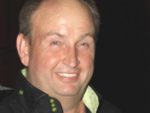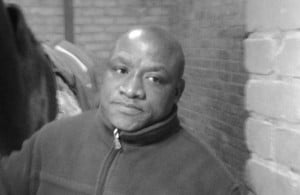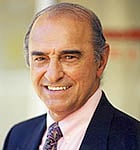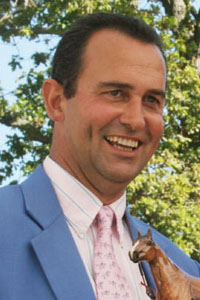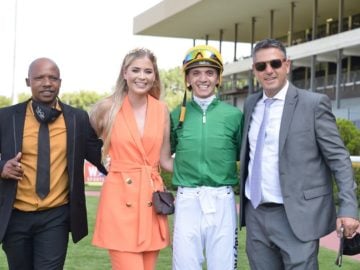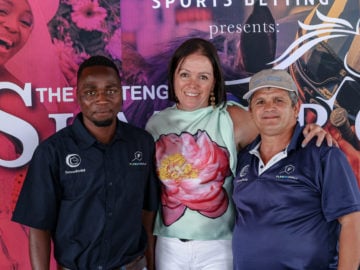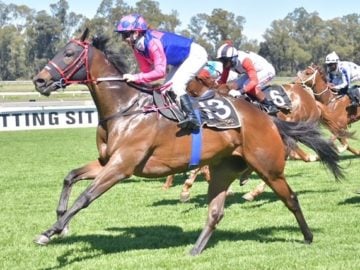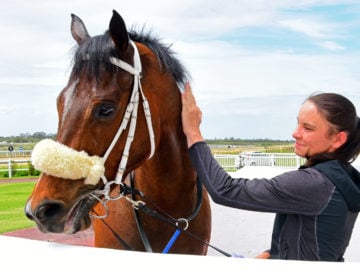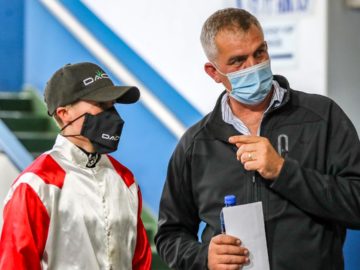While his children have had access to education opportunities that he never had, nothing has changed materially in the twenty years since the advent of democracy, says one of the Cape’s most experienced Head Grooms.The man who has tended to some of our greatest racehorses, including the champion racehorse turned sire sensation, Dynasty, tells us about his life and a love of the horse. We also asked him why white guys generally don’t become grooms in this country.
Never Die Mbombi has worked for the Kannemeyer Racing Team for 32 years and says that he has been encouraged to develop and grow to a position where he holds a key management position in a successful yard. He says he would go to war for the family that have been a part of his life for so long.
What is your name?
Zamayedwa Mbombi, but I am known by everybody in horseracing by the name, ‘Never Die’.
What is your age?
I turn 52 next Wednesday .
Where were you born?
Tsolo in the Transkei.
Tell us about your family.
My wife and two eldest children (22 and 19) live with me. My youngest child, a 13 year old boy lives in Transkei.
My Mom, who retired from the Lorraine Mine kitchen, is 72 and partly disabled due to a stroke. She lives in Transkei and I phone her most days. My Dad also worked on the same mine and he died last year.
Where do you live?
Like many of the grooms here at Milnerton, I stay in Dunoon, which is ten minutes away from the stables.
How would you describe your quality of life?
One adapts to any lifestyle. I work hard and enjoy my work. I have a loving family around me. We don’t go hungry and have a roof over our heads. I have my church. Those are the basic needs.
Do you have your own home and car?
I live in a zinc structure and no, I have never owned a car. But the taxis get us where we want to be.
Where did you go to school and what level of education did you achieve?
I went to school in Transkei and Welkom, where, as I mentioned, my parents worked on the mines. I achieved a standard five. They were not easy days but earning a living was more important then than an education. That makes no sense to me today!
Have you attained any formal qualifications since?
I am proud to say that the Kannemeyers encouraged me to attend the Western Province Grooms School. I studied hard and achieved my stable employee’s exams. I am an NHA licenced Stable Employee. It has added great value to my contribution as a key member of the DKR team.
What other yards have you worked at?
I joined Mr Kannemeyer in 1982. I have been there ever since and I wouldn’t want to work for anybody else.
I have been offered jobs by many good trainers, and was even approached once by Gold Circle. It would have meant more money, but working with horses is more my love than tracks and grounds.
What is your current position?
I am Head Groom. So I supervise feeding and oversee the staff in terms of rostering and general needs. I am a liaison between the grooms and management.
What are your working hours?
It differs slightly from summer to winter. Basically it is 05h30 to 11h00 and then I am back from 14h00 to 17h00. It is a long day and winter is tough!
Who gave you that unique name ‘Never Die’, and why?
Mr Peter Kannemeyer gave it me when I started working. Believe it or not, I was a Rastafarian then still and he used to say every morning, ‘Rasta will never die.’ It stuck!
You are clean shaven and have looked like Kojak since as long as many of us can remember. It is difficult to imagine you with dreadlocks!
Yes, I had the hair in those days. I was a committed Rastafarian but converted to a more Christian and orthodox lifestyle in 1997.
Why did you convert, if we may ask?
For many reasons. Despite the fact that it was a healthy dietary lifestyle in terms of no meat, I didn’t enjoy the side effects but don’t want to go into too much detail. My Uncle eventually took me to church and persuaded me to conform.
I have not regretted it and haven’t had a drink or smoke since.
You have staff by the names of ‘Young One’, ‘Somewhere’, ‘Trailer’ and ‘Ten Rand’ reporting to you. Do you find the grooms’ nicknames patronising or offensive in any way?
No, not at all! It is part of the culture in the industry. And let’s face it, if we went by the names our fathers gave us in our ID books, it would be counterproductive as communication would be hindered.
Do you have any hobbies?
No. My church takes up most of my spare time. I am a Reverend in the Umkhombe KaNowa Gospel Ministries. Loosely translated that means Noah’s Ark. I attend church from 7 to 8 in the evenings on weekdays and then Sundays from 10h00 to 15h00.
Do you find your experience with the church helps in your work?
Yes, I believe it does. We have social problems like any industry. There is illness and abuse of alcohol and drugs in our community. I try and assist the younger grooms in going the right direction.
Funny how wisdom always comes with age and life experience!
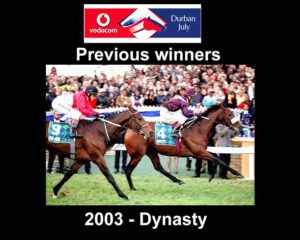 What was your greatest day in racing?
What was your greatest day in racing?
I have been lucky to have looked after some really top racehorses. Dynasty probably stands out and the day he won the July was just something so special.
Then Eli’s Truth was underrated but first class and his wins in the Cape Guineas and Derby Futurity were brilliant. He also ran second in the Met in 1997 to London News. Glen Hatt rode him.
Then Oriental was a very good horse too. He won the 1995 KZN Derby with Freddie Macaskill in the saddle.
Those were happy days!
We seldom see a white person doing the job of a groom in SA. Why do you think this is the case?
It is one of those strange realities of life, I suppose.
I remember Devin Ashby was employed by Mr Andries Steyn as a groom and he went on and qualified as a professional jockey and is overseas and doing really well, I hear.
Mr Eric Sands also employed two white ladies as grooms some years ago.
But these were exceptions, more than the rule. Maybe it is the modest wages and the working conditions are possibly too tough too?
Do Grooms earn enough?
As key staff and being the largest sector of the industry, probably not. But it is all about making the business viable.
At DKR we are well looked after. Dean has followed his father’s example when it comes to being good to the staff. We look after expensive and quality horses.
On the other hand, one must wonder if any man ever really earns enough.
With the cost of living today, it is difficult for everybody and we all have a lifestyle that we seek at some level. I keep mine simple.
There are a lot of politics in racing. Do you or your fellow grooms ever get involved in the debate?
I used to be a shop steward, but am not involved in the unions any more. As far as corporate politics go, no, that sort of thing doesn’t interest me at all.
What do you think of the future of Cape racing?
We hear that things are difficult and we don’t race much in winter. But then summer comes and all the great races are run here and our customers arrive and visit their horses. I don’t understand the financial aspect of it. But horseracing will never die out. There are too many people who depend on it and love the game.
Do you punt on the horses?
I am not an addict as I work too hard for my money. But I do have a bet from time to time, but then only on the Dean Kannemeyer horses! We have good horses who are well fed and fit. So we always have a good run for our money.
Away from racing, how has the advent of the new South Africa impacted on your life?
Not as much as we all believed it would, I suppose.
I still live in a squatter camp and having a right to vote doesn’t put food on the table or provide shelter from the winter for anybody.
But it is still a lot better than the bad old days when the police used to chase us and demand pass books.
How do you feel about the future of the country?
I am a person of faith and remain positive. I continue to have a dream of owning my own home one day.
There are also good things to have come out of the last twenty years.
Like my children having access to an education. Especially in the Cape area.
I listen to them speaking perfect English and I feel so proud.
They will have better quality lives I hope and maybe they will be making the important decisions in the boardrooms of industry that shape other people’s lives.
Maybe that simple empathy is what is lacking most of all today.
‹ Previous
